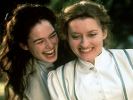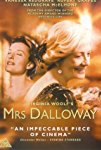Eye For Film >> Movies >> Mrs Dalloway (1998) Film Review
Mrs Dalloway
Reviewed by: Angus Wolfe Murray

Although Sally Potter's adaptation of Orlando was an exceptional work of cinematic imagination, Virginia Woolf is not a writer likely to receive the EM Forster/Henry James treatment. Plot takes a casual second to streams of consciousness, which cannot be transposed onto the screen with natural ease.
Anyone unfamiliar with Woolf's work will find Mrs Dalloway disjointed and introspective. Why are these dull men and spirited women interesting? Is the fact that mature lives have not matched up to youthful aspiration a good enough reason to construct a script around it? What does a shell shocked, suicidal ex-soldier (Rupert Graves) have to do with a society hostess (Vanessa Redgrave), worrying about her party?

In the novel, such disparate characters fit into the questioning nature of womanhood, the meaning of life, the legacy of a terrible war, the claustrophobic structure of the English class system, circa 1923, and "What makes us go on?" In the film Mrs D floats through the day of her party, buying flowers, mending a dress, chatting to a beau she hasn't seen for 30 years, while thinking about the old days when she sat on the lawn in summer with Sally (Lena Headey) and Peter (Alan Cox), talking of love without understanding any of it.
The past and present are linked with only limited success. Young Clarissa (Natascha McElhone) has an innocence and energy that emerges in Mrs Dalloway as wistful sadness. The vibrant feeling between Clarissa and Sally, even that chaste kiss at the dance, lead not to scandalous union but an acceptance of the conventional way. "Marriage is a catastrophe for women," Sally warns. "But isn't it inevitable?" Clarissa replies. She is not a brave girl. "Life seems to me to be very dangerous."
The matching of the young with the old is perhaps intentionally off the mark. The Redgrave/McElhone combination works well, but the others aren't close. Peter as a young man looks like Nigel Lawson after a heavy day at No 10. Middle-aged (Michael Kitchen doing his Richard Todd impersonation), he appears to have shrunk and lost those bags under his eyes. Richard Dalloway (Robert Portal) becomes a Tory MP (John Standing) and metamorphoses into a balder, shorter and less imposing person. As for Sally, she grows into a hearty, chubby country gal (Sarah Badel), married to a cotton baron with four strapping sons. So much for Sappho and her island.
The sub-plot, concerning Rupert Graves's mentally disturbed officer has no connection with Mrs Dalloway's thoughts on missed opportunities. He is symbolic of the post traumatic Twenties, the voice of Virginia's anguish. Marleen Gorris, the Dutch director who won an Oscar for Antonia's Line, concerns herself, as you might expect, with the feminine side. The men are piteous drips or shy bores. Country house life was more fun than this, even when there was nothing to do but flirt on the tennis court and play games in the drawing room after dinner.
Reviewed on: 19 Jan 2001


















